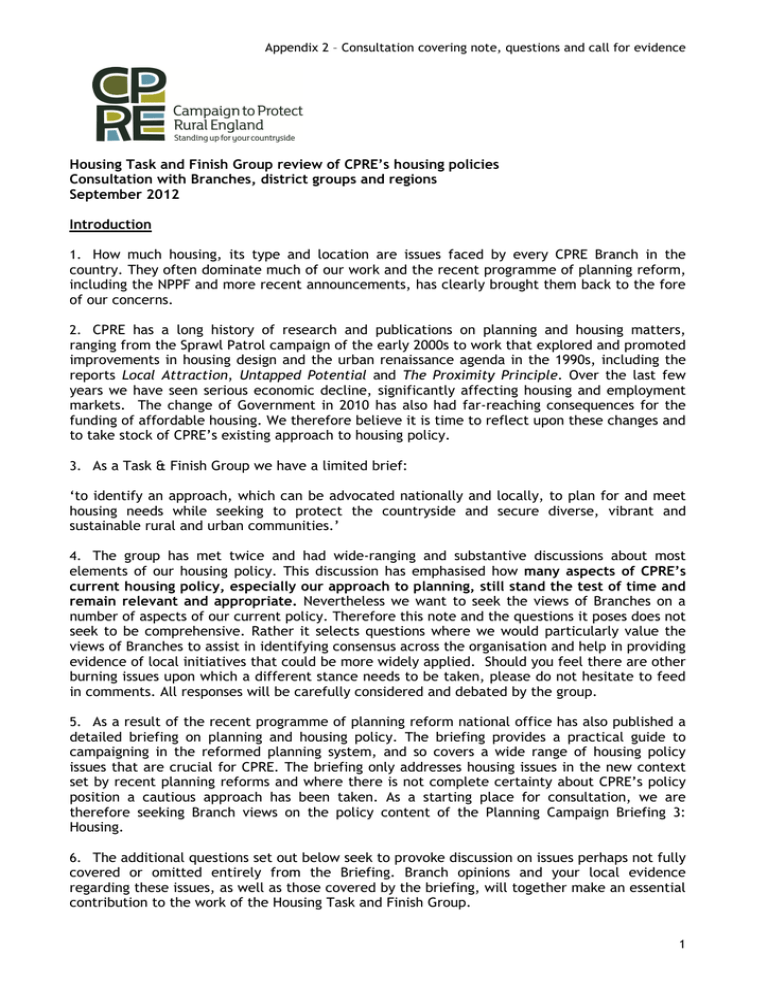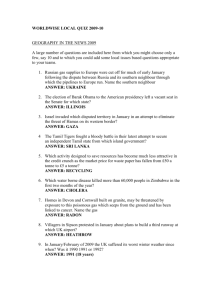Housing Task and Finish Group review of CPRE`s housing policies
advertisement

Appendix 2 – Consultation covering note, questions and call for evidence Housing Task and Finish Group review of CPRE’s housing policies Consultation with Branches, district groups and regions September 2012 Introduction 1. How much housing, its type and location are issues faced by every CPRE Branch in the country. They often dominate much of our work and the recent programme of planning reform, including the NPPF and more recent announcements, has clearly brought them back to the fore of our concerns. 2. CPRE has a long history of research and publications on planning and housing matters, ranging from the Sprawl Patrol campaign of the early 2000s to work that explored and promoted improvements in housing design and the urban renaissance agenda in the 1990s, including the reports Local Attraction, Untapped Potential and The Proximity Principle. Over the last few years we have seen serious economic decline, significantly affecting housing and employment markets. The change of Government in 2010 has also had far-reaching consequences for the funding of affordable housing. We therefore believe it is time to reflect upon these changes and to take stock of CPRE’s existing approach to housing policy. 3. As a Task & Finish Group we have a limited brief: ‘to identify an approach, which can be advocated nationally and locally, to plan for and meet housing needs while seeking to protect the countryside and secure diverse, vibrant and sustainable rural and urban communities.’ 4. The group has met twice and had wide-ranging and substantive discussions about most elements of our housing policy. This discussion has emphasised how many aspects of CPRE’s current housing policy, especially our approach to planning, still stand the test of time and remain relevant and appropriate. Nevertheless we want to seek the views of Branches on a number of aspects of our current policy. Therefore this note and the questions it poses does not seek to be comprehensive. Rather it selects questions where we would particularly value the views of Branches to assist in identifying consensus across the organisation and help in providing evidence of local initiatives that could be more widely applied. Should you feel there are other burning issues upon which a different stance needs to be taken, please do not hesitate to feed in comments. All responses will be carefully considered and debated by the group. 5. As a result of the recent programme of planning reform national office has also published a detailed briefing on planning and housing policy. The briefing provides a practical guide to campaigning in the reformed planning system, and so covers a wide range of housing policy issues that are crucial for CPRE. The briefing only addresses housing issues in the new context set by recent planning reforms and where there is not complete certainty about CPRE’s policy position a cautious approach has been taken. As a starting place for consultation, we are therefore seeking Branch views on the policy content of the Planning Campaign Briefing 3: Housing. 6. The additional questions set out below seek to provoke discussion on issues perhaps not fully covered or omitted entirely from the Briefing. Branch opinions and your local evidence regarding these issues, as well as those covered by the briefing, will together make an essential contribution to the work of the Housing Task and Finish Group. 1 Appendix 2 – Consultation covering note, questions and call for evidence 7. Please don’t feel the need to respond to every question as they cover the span of the questions the Group is considering as part of this comprehensive review of our policy. 8. Importantly, your evidence of practical initiatives will assist in ensuring that our Review, in aiming to update CPRE’s policy approach to sustainable housing development, remains practical and capable of being promoted to officials and politicians in the current context. Consultation Question 1 – Do you support the summary, set out below, as a starting point for our policy approach? ‘We accept that there is undoubtedly a need to build some new homes in some parts of England. However, we do not accept that that this means simply attempting to ‘predict and provide’. Housing policy should not merely be a simple numbers game. Rather the scale of future housing provision in any area should be • • • • • • closely related to household need in terms of location, size, type and tenure; based upon a robust and up to date evidence base, including economic forecasts; make best use of our existing stock and infrastructure; take account of environmental, social, service and infrastructure capacity; respect any national environmental designations; and, be agreed through a democratic and transparent plan-led system. We believe that the planning system has a key role to play in solving the housing challenge. In the short term, however, the evidence points to the constraint on the provision of new homes being primarily financial. In particular, mortgage availability continues to be squeezed, in turn putting downward pressure on demand. Significant cuts have been made to public funding for affordable homes. And finally, changes have been made to the terms on which section 106 agreements can be used to secure affordable housing on market sites. Measures which support more balanced economic development throughout England could assist in reducing some of the pressures being felt in the south and aid regeneration in the north. These regional discrepancies mean that the approach taken by individual regions and Branches may of necessity vary.’ Question 2 – Are there aspects of CPRE’s current policy as set out in Planning Campaign Briefing 3: Housing that require change? Question 3 – In particular, what are your views on the issues below regarding land supply and Green Belt? a. would it be effective for CPRE to call for the inclusion of binding phasing policies in Local Plans with a formal process of ‘plan, monitor and manage’ via 5 yearly reviews? b. should CPRE abandon its call for a national brownfield target for housing provision and concentrate upon securing the inclusion of targets in each Local Plan? c. are there any circumstances in which Green Belt boundaries should be seen as absolutely inviolate? Should CPRE’s current strong support for Green Belts be more formally caveated and subject to review? 2 Appendix 2 – Consultation covering note, questions and call for evidence d. does your Branch support the inclusion of ‘sustainable urban extensions’ in Local Plans, where justified by need and after policies have made the best use of land and buildings in the urban area? e. under what circumstances would a free standing new settlement be acceptable in your area or should they always be resisted? do you believe that Village Green designations and/or application of the new Local Green Space Allocations should be used as a tool to resist development in parts of your area? f. g. should CPRE support measures, for example fiscal incentives, to encourage developers to build out their stock of existing planning permissions more quickly, when combined with strong brownfield priority and phasing policies? Question 4 – What are your views on the issues below regarding site viability? a. should CPRE call for the use of ‘open book accounting’ and support the formulation of an independent panel of arbitrators to resolve issues of viability on sustainable housing sites where delivery is stalled? b. do you support the re-negotiation of section 106 agreements in order to secure the earlier development of a brownfield site? Or in such cases should developers be required to submit a new application? c. are there other practical economic incentives that you believe would assist in developing homes in the right location, for example, on brownfield sites? Question 5 – What are your views on the issue below regarding infrastructure provision? a. should planning permission automatically be refused for major planning applications which demonstrably fail to make provision for supporting infrastructure and services, or where serious doubt exists about its impact on the use of resources such as water supply? Question 6 – What are your views on the issues below regarding making best use of existing stock? a. should VAT be equalised on new build and refurbishments? b. should the rule be removed whereby property left empty for over two years can be then be refurbished VAT free i.e. removing what could be an incentive to leave properties vacant for a certain period of time? c. should Empty Dwelling Management Orders be available for use on vacant property after one year and not as at present 2 years? d. should even more stringent local taxes be placed on second homes that are not available to rent for at least 3 months’ per annum? e. should there be a reduction in stamp duty for those voluntarily down-sizing or buying a less expensive home in the same locality? How might this work in practice? f. are there any other incentives that CPRE might promote to reduce under occupancy, for example, re-banding Council Tax, removing single occupancy discounts, relaxing planning controls over building conversions? 3 Appendix 2 – Consultation covering note, questions and call for evidence Question 7 – What are your views on the issues below regarding affordable housing? a. have you successfully resisted the loss of an agreed element of affordable housing in a development after planning permission has been granted? b. should our policies seek to promote the special need for subsidised affordable homes for those excluded from the open market because of ability to pay? Question 8 – What are your views on the issues below regarding rural affordable housing? a. should Rural Exception Sites continue to be used as a means of securing the provision of affordable housing in villages? b. should Rural Exception Sites be limited to key settlements where there is an existing supply of services or will this undermine the purpose of providing affordable housing in the most appropriate locations for those who need it in the countryside? What are your Branch views on this issue? c. in light of current serious funding constraints for affordable housing, does your Branch support the principle of cross subsidy as a means to secure the development of affordable homes in villages? If yes, should this approach extend to Rural Exception Sites? d. should CPRE call for the ring fencing of receipts received from Right to Buy properties in order to provide replacement ‘affordable’ homes in the same locality? e. what are your Branch’s views on the Community Right to Build provisions of the Localism Act? Do you see them as a positive concept or are they likely to create problems? f. have you any positive examples of self-build and co-operative schemes that have helped with the provision of rural affordable housing? g. should our policies promote the idea of specific land allocations and designations for affordable housing? Would this assist in creating a greater supply to meet need or merely serve to underline divisions in our society? Question 9 – What are your views on the issues below regarding environmental performance standards and the design of new housing? a. should CPRE campaign for a return to more ambitious targets for improving the environmental performance standards of new dwellings? For example, targets for all new homes to meet Code for Sustainable Homes Levels 4-6? b. to what extent should CPRE focus on the design and quality of new housing as well as the quantity and location? Question 10 – What are your views on isolated dwellings in the countryside policy? a. is your Branch concerned about the criteria set out in the NPPF for approving isolated dwellings in the countryside? 4 Appendix 2 – Consultation covering note, questions and call for evidence Possible future areas of work/research aa. Should CPRE become involved in researching examples of high quality, high density and flexible living homes? bb. Should CPRE undertake a research exercise, with others, to investigate existing barriers and recommend additional measures to secure the re-use of vacant and underused buildings to create new homes? cc. Should CPRE undertake a full scale monitoring exercise of the provision of and barriers to the provision of affordable housing in rural areas with a view to making policy proposals? dd. Should CPRE consider preparing a ‘sustainable hierarchy’ and campaign for the provision of new homes that encompasses location, type, standards and design issues? 5

